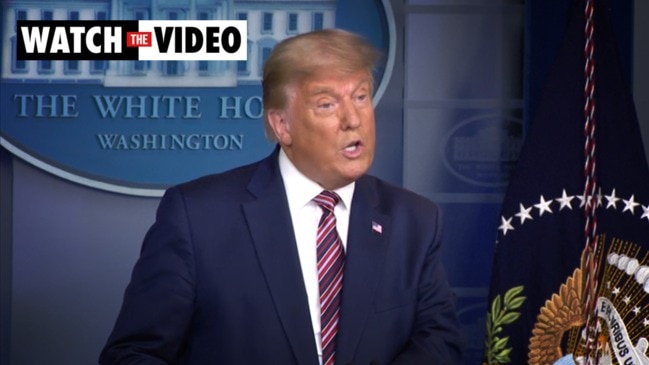
As Joe Biden edges closer to victory over Donald Trump, if you want clues to what’s happened in America in the past few extraordinary years, and to what the future of politics may look like, remember names like Zapata County, Texas, Proposition 16 in California and proposed Constitutional Amendment 2 in Florida.
Zapata County sits on the Mexico border and its population is about 85 per cent Hispanic. It’s long been part of the reason Democrats have held high hopes about turning the historically red state of Texas Democratic blue. As the Lone Star State becomes less white and more diverse, it has seemed inevitable that it would eventually shift into the Democratic column. Zapata has voted Democrat for the past 30 years and Hillary Clinton won it with almost two thirds of the vote in 2016.
READ MORE: ‘We got smoked. There is no sugarcoating it’ | Trump to speak as Biden nears victory | Trump captured a bit of America’s bold frontier spirit | Trump takes counting to court | Trump’s disdain for McCain costs him in Arizona
On Tuesday, a majority of its voters, like the rest of Texas, went for Trump. Somewhere in the shadow of the half-built border wall, the voters didn’t get the message that the Republican president is a bigot who wants a whites-only United States.
Instead, it seems, they liked the Republican message of economic opportunity for all, traditional values and, above all, freedom from the strictures of the progressive finger-wagging cultural elites. The endlessly repeated message that if your skin is brown then you must vote Democrat didn’t resonate.
Next, take a look across the country at Proposition 16 in California. The Golden State is in part a plebiscitary democracy and decisions by its voters every two years have often been signals for the direction of national politics. The anti-tax Proposition 13 in 1978 signalled the Ronald Reagan revolution that was to sweep the country soon afterwards.

Proposition 16 would have repealed a constitutional provision that makes it unlawful for state and local governments to discriminate on the basis of race against applicants to schools and colleges and for public- sector jobs. Its aim was to reintroduce affirmative action for minorities which had been abolished in a 1996 referendum.
On Tuesday the effort was rejected by a double-digit margin, despite a massive state-backed campaign and a huge financial contribution from outside groups to support it.
After being told for months that America is an irredeemably racist country that needs to atone for its white privilege, voters in the nation’s most solidly Democratic state, many of them Hispanic, Asian and, polls suggest, black, decided that awarding opportunity purely on the basis of race was inconsistent with the ideals of American democracy.
Finally, consider Constitutional Amendment 2 in Florida, a proposal to raise the minimum wage from $8.56 per hour to $10 and then by one dollar increments until it reaches $15 in 2026. Many Republicans opposed the measure, along with business leaders who spent heavily to make the claim that it would raise costs and lead to job losses. But in a state that once again voted for Mr Trump, a significant number of Republicans joined Democrats to pass it, ensuring it reached the 60 per cent threshold needed to enshrine it in the state’s constitution.
Of course, Mr Trump and his party (it seems, at least) lost the vote that most mattered. He lost both because of his manifest failures as a leader in times of a national crisis, and because too many Americans have been repelled by his language and demeanour, his evident disregard for decency and the norms of political and civil discourse.

But Democrats’ efforts to crush not only Mr Trump, but Trumpism, fell well short. In still-Republican Texas, heavily Democratic California and the perennial swing state of Florida, there were signs of a powerful new constituency for a populist platform that challenges the nostrums of both cultural elites and economic establishment.
It’s Mr Trump’s singular ability to appeal to this constituency, rather than the endless media caricature of an authoritarian bigot, that best captures the significance of this political neophyte. Even in (apparent) defeat, Mr Trump defied the predictions of pollsters, the ravages of a pandemic, a big financial advantage for his Democratic opponent and the best efforts of a media that has simply disgraced itself with its complete abandonment of any last pretence of objectivity.

Republicans seem likely to hold on to their Senate majority, thereby depriving Mr Biden of an opportunity to get much done when he takes office. The party also made big gains in the House of Representatives, in the process delivering the election of more Republican women than ever before.
The Trump paradox is both an opportunity and a challenge for the Republican Party. The opportunity is the prospect of a party that can finally escape the demographic trap it has set itself. Mr Trump’s populism seems to have won for the party a higher share of the non-white vote than any Republican has received in 60 years. It offers the promise of a party that can appeal to voters across race and heritage to all those who feel abandoned by the nation’s contemptuous elites.
But as he has demonstrated better than ever in the past few weeks, Mr Trump is both a flawed messenger and perhaps the most effective political campaigner that the Republicans have had since Ronald Reagan. If he has indeed lost it’s not clear what Mr Trump will do next. He may well choose to run again in 2024. Whether he does or not, he has opened up a new and promising path for the Republican Party.
The Times




While the headline presidential vote numbers inevitably consume most attention in the wake of a US election, the deeper meaning and context of the popular choice can often be found in state and local-level details.